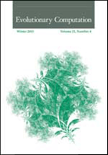
EVOLUTIONARY COMPUTATION
metrics 2024
Advancing Algorithmic Innovation Through Nature's Wisdom
Introduction
EVOLUTIONARY COMPUTATION, published by MIT PRESS, is a premier journal in the field of Computational Mathematics, holding a distinguished Q1 ranking in the 2023 category and an impressive 87th percentile in Scopus rankings for Computational Mathematics. Since its inception in 1996, the journal has served as a critical platform for presenting cutting-edge research and development in the applications and theory of evolutionary algorithms. Recognized for its rigorous peer-review process, EVOLUTIONARY COMPUTATION invites contributions that advance the understanding of algorithmic strategies inspired by natural evolution, thereby playing a significant role in the scientific community. The journal is pivotal for researchers, professionals, and students aiming to explore innovative methodologies and applications of evolutionary techniques in diverse fields. With a focus on fostering collaboration and knowledge dissemination, this journal not only serves the academic community but also impacts industry practices, encouraging the integration of these evolutionary approaches into real-world problems.
Metrics 2024
 1.17
1.17 4.60
4.60 4.90
4.90 90
90Metrics History
Rank 2024
Scopus
IF (Web Of Science)
JCI (Web Of Science)
Quartile History
Similar Journals

COMPUTATIONAL & APPLIED MATHEMATICS
Unveiling Solutions Through Rigorous Mathematical ResearchCOMPUTATIONAL & APPLIED MATHEMATICS, published by SPRINGER HEIDELBERG, serves as a premier platform for the dissemination of high-quality research and advancements in the fields of applied and computational mathematics. With an esteemed reputation bolstered by a Q2 ranking in both Applied Mathematics and Computational Mathematics categories, this journal delivers invaluable insights that cater to the scholarly community, including researchers, professionals, and students. It features rigorous peer-reviewed articles that cover a wide array of mathematical models, numerical algorithms, and their applications across various scientific and engineering domains. The journal has been in circulation since 2003 and remains relevant through its commitment to publishing cutting-edge research until 2024. Though not open access, its impact within the academic landscape is significant, with Scopus rankings placing it in the top quartiles of its fields. Whether you are seeking to stay updated on the latest findings or contribute your own work, COMPUTATIONAL & APPLIED MATHEMATICS is an essential resource for those committed to the advancement of mathematical sciences.

Natural Computing
Unlocking Nature's Secrets for Computational AdvancementNatural Computing is a leading peer-reviewed journal published by Springer, focusing on the interdisciplinary study of natural computation methods and their applications across various domains. With an ISSN of 1567-7818 and an E-ISSN of 1572-9796, this journal has established itself as vital in the field of Computer Science Applications, as reflected in its esteemed Q2 quartile ranking and a Scopus rank of #358 among 817 journals, placing it in the 56th percentile. Based in the Netherlands, Natural Computing covers a diverse range of topics, including computational models inspired by natural systems, evolutionary algorithms, and swarm intelligence. Seeking to bridge the gap between theoretical research and practical applications, this journal serves researchers, professionals, and students by providing insights and advancements in the field. With a commitment to fostering innovation, Natural Computing aims to push the boundaries of understanding in computational methods inspired by nature, making it an essential resource for those looking to contribute to and stay updated within this dynamic area.
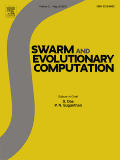
Swarm and Evolutionary Computation
Advancing Algorithms for a Smarter Future.Swarm and Evolutionary Computation is an esteemed academic journal published by Elsevier, dedicated to the exploration of innovative algorithms and methodologies derived from principles of swarm intelligence and evolutionary computation. With its ISSN 2210-6502 and E-ISSN 2210-6510, this journal has earned a prominent position in the field, evidenced by its Q1 category rankings in both Computer Science and Mathematics for 2023, reflecting its high impact and relevance. The journal's Scopus rankings further underscore its significance, placing it in the top percentile of mathematics and computer science journals. As an open-access platform, it aims to disseminate groundbreaking research that addresses real-world challenges and fosters interdisciplinary collaboration. Researchers, professionals, and students are encouraged to engage with this journal to contribute to and benefit from the ongoing advancements in swarm intelligence and evolutionary methods, which have become instrumental in solving complex optimization problems across diverse fields.
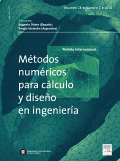
Revista Internacional de Metodos Numericos para Calculo y Diseno en Ingenieria
Empowering Innovation in Applied Mathematics and EngineeringRevista Internacional de Metodos Numericos para Calculo y Diseno en Ingenieria is a prominent academic journal dedicated to the dissemination of innovative research and methodologies in the fields of applied mathematics and engineering. Published by SCIPEDIA S L in Spain, this journal has been an essential resource for researchers since its inception in 1987, transitioning to an Open Access model in 2016 to enhance accessibility and foster collaboration among professionals and academics globally. Currently indexed in Scopus, it holds a Q4 category designation in both applied mathematics and miscellaneous engineering fields for 2023, reflecting its focus on advancing numerical methods to solve engineering problems. Despite ranking at the lower percentile, it serves as a vital platform for emerging scholars and practitioners aiming to contribute to cutting-edge developments in numerical techniques and engineering design. The journal's commitment to providing a forum for new ideas makes it an invaluable asset for students, researchers, and industry professionals seeking to stay abreast of advancements in the discipline.

Symmetry-Basel
Advancing interdisciplinary research for a balanced future.Symmetry-Basel is an esteemed open-access journal published by MDPI, dedicated to advancing research in the interdisciplinary realms of Chemistry, Computer Science, Mathematics, and Physics. Launched in 2009, this robust platform facilitates the dissemination of cutting-edge studies and innovations, providing unrestricted access to a vast audience of researchers, professionals, and students alike. With an impressive convergence period extending from 2009 to 2024, Symmetry-Basel has rapidly garnered recognition, achieving a Q2 quartile ranking across multiple categories in 2023 and notable Scopus rankings that underscore its academic influence, including a commendable 94th percentile in General Mathematics. Situated in Basel, Switzerland, the journal not only promotes high-quality research but also fosters collaboration and dialogue among various scientific disciplines, thereby enhancing the interconnectedness of these dynamic fields.

Evolving Systems
Innovating Interdisciplinary Insights in System EngineeringEvolving Systems, an esteemed journal published by Springer Heidelberg, focuses on advancing the interdisciplinary field of evolving systems, encompassing areas such as computer science applications, control and optimization, control and systems engineering, and modeling and simulation. Since its inception in 2010, the journal has made significant contributions to the academic community, currently holding a commendable Q2 ranking across multiple categories for the year 2023. With an impactful focus on the dynamic behaviors of systems and their adaptive methodologies, Evolving Systems serves as a crucial platform for researchers, professionals, and students aiming to explore and expand the boundaries of system evolution. Despite being a subscription-based journal, it remains committed to fostering high-quality research dissemination and encourages submissions that push the envelope of knowledge in this rapidly developing field. The journal employs a rigorous peer-review process, ensuring the publication of cutting-edge research that meets the highest scholarly standards.
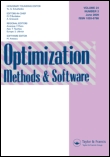
OPTIMIZATION METHODS & SOFTWARE
Driving Excellence in Optimization Methods and Theoretical InsightsOPTIMIZATION METHODS & SOFTWARE, published by Taylor & Francis Ltd in the United Kingdom, is a premier journal dedicated to the field of optimization and software development. With an impressive impact factor, this journal maintains a critical role in advancing research in applied mathematics, control, and optimization, as evident from its categorization in the prestigious Q1 quartile for both applied mathematics and control and optimization, and Q2 in software for the year 2023. Over its publication span from 1992 to 2024, it has garnered significant recognition, ranking #116 out of 635 in applied mathematics and #29 out of 130 in control and optimization according to Scopus. The journal provides a platform for innovative research outcomes, theoretical advancements, and novel algorithms that aid researchers, professionals, and students in tackling complex optimization problems. Whether you are looking to disseminate your latest findings or explore cutting-edge methodologies, OPTIMIZATION METHODS & SOFTWARE remains an invaluable resource in the field.
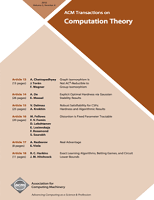
ACM Transactions on Computation Theory
Pioneering Research in the Realm of Computation Theory.ACM Transactions on Computation Theory, published by the Association for Computing Machinery, is a prestigious journal dedicated to advancing the field of computation theory and theoretical computer science. With an ISSN of 1942-3454 and an E-ISSN of 1942-3462, this journal serves as a vital resource for researchers and professionals seeking to explore groundbreaking developments in computational models, algorithms, and their mathematical foundations. The journal's rigorous standards have earned it a significant position within the academic community, as evidenced by its 2023 category quartiles, ranking in the Q1 category for Computational Theory and Mathematics and Q2 for Theoretical Computer Science. Although it operates through traditional subscription access, it maintains a critical role in disseminating cutting-edge research and fostering collaboration among experts in the United States and beyond. As an influential platform, ACM Transactions on Computation Theory is committed to contributing to the ongoing dialogue and advancement of computation theory, making it essential reading for anyone passionate about this dynamic field.

SOFT COMPUTING
Fostering Interdisciplinary Collaboration for a Smarter FutureSOFT COMPUTING is a premier international journal published by Springer, focusing on the interdisciplinary field of soft computing, which includes areas such as fuzzy logic, neural networks, genetic algorithms, and their applications. With an ISSN of 1432-7643 and E-ISSN 1433-7479, the journal is based in Germany and contributes significantly to the advancement of knowledge in its fields, boasting an impressive Scopus ranking that places it in the top echelons of Geometry and Topology, Theoretical Computer Science, and Software categories. In the 2023 category quartiles, it has achieved Q2 rankings in multiple disciplines, reflecting its high-quality research contributions. Though not Open Access, the journal's rigor and relevance to contemporary issues make it a favored resource for researchers, professionals, and students alike. From its inception in 2000 and spanning across the years until 2024, SOFT COMPUTING continues to serve as a robust platform for innovative research and theoretical advancements, making it an essential read for anyone engaged in the rapidly evolving landscape of computational intelligence.
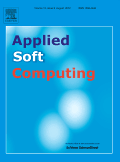
APPLIED SOFT COMPUTING
Empowering technology with cutting-edge soft computing insights.Applied Soft Computing is a premier international journal published by Elsevier, dedicated to advancing the field of soft computing in various applications. With an ISSN of 1568-4946 and E-ISSN of 1872-9681, it has established itself as a leading resource with a commendable impact factor and significant importance in its field. As of 2023, it ranks in the Q1 category of Software in Scopus, boasting a rank of 25 out of 407 journals in Computer Science, Software, representing the 93rd percentile among peers. The journal's primary objective is to publish high-quality, innovative research articles that explore soft computing methodologies and their applications across diverse domains, fostering interdisciplinary collaboration and advancing technological solutions. Based in the Netherlands, at Radarweg 29, 1043 NX Amsterdam, it serves as a vital platform for researchers, professionals, and students eager to contribute to and stay informed about the latest developments in soft computing.